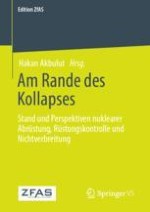2021 | OriginalPaper | Buchkapitel
An Eroding Nuclear Taboo? Neue Waffensysteme, Strategien und normative Herausforderungen
verfasst von : Markus Kornprobst
Erschienen in: Am Rande des Kollapses
Verlag: Springer Fachmedien Wiesbaden
Aktivieren Sie unsere intelligente Suche, um passende Fachinhalte oder Patente zu finden.
Wählen Sie Textabschnitte aus um mit Künstlicher Intelligenz passenden Patente zu finden. powered by
Markieren Sie Textabschnitte, um KI-gestützt weitere passende Inhalte zu finden. powered by
